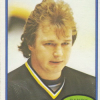Randy Carlyle

Randy Carlyle
Randolph Robert Carlyleis a Canadian former professional ice hockey player. He is currently the head coach of the National Hockey League's Anaheim Ducks and formerly the head coach of the Toronto Maple Leafs. He was raised in Azilda, just northwest of Sudbury, Ontario. He won the Stanley Cup in 2007 with the Ducks during his first stint with the team. As a player, Carlyle dressed for over 1000 games between the Toronto Maple Leafs, Pittsburgh Penguins and Winnipeg Jets, winning...
ProfessionCoach
Date of Birth19 April 1956
CityGreater Sudbury, Canada
Our expectations are that we're going to try to play an uptempo game, and our players seem to have responded positively to that.
We really stayed with our work ethic. Our players seem to enjoy that.
We have to make sure our players are disciplined to the point, where they can't put themselves or their team in a situation that's going to cost their hockey club goals, momentum, whatever you want to call it.
We made a decision probably three weeks ago that we were going to go with some of these guys. We made a list of six or seven, and those players were on it. We thought we'd change it up a bit.
Training camp's not fun, especially the first day. It's not supposed to be fun. It's about work. We understand that the players are getting a first opportunity to be put through their paces, and our work ethic and our commitment to conditioning will be very, very hard.
Ultimately, the player makes the decision. The one thing we were adamant about was we didn't want 20 minutes. If it took 100 minutes, we wanted him to commit to 100.
Our players deserve the credit. They took the responsibility. We got down 3-1, we battled back. We found a way.
They provide us with the Olympic break and we have to take advantage of it. Our expectation will be for our players to come back fresh and ready.
I think in these situations, the player tells you what's going on. We understand that it's not ideal. He says his pain tolerance is bearable, and we'll continue to go on. Obviously, it's something he's willing to put aside at this point. You have to support the decision that he makes.
He responded well; that's what you expect of a veteran player who drew a lot of attention to himself in an incident like that. He turned a negative into a positive. He used it as a motivational tool.
Our players worked extremely hard. It was a fast-paced game, and it wasn't no-hit hockey. It was a physical game and those are tough ones to play.
We took a different approach, doing some off-ice stuff. The players would rather do that than come to the rink and get skated. We had a little laugh, a little team bonding and it really showed tonight. We had lots of energy early.
For some of these players who haven't played for some 16 months, it shows that there's a commitment to preparation and that's always a positive.
How it works is you have an organization that provides you with players, and our job, as we’ve said all along, is just to coach ’em up.